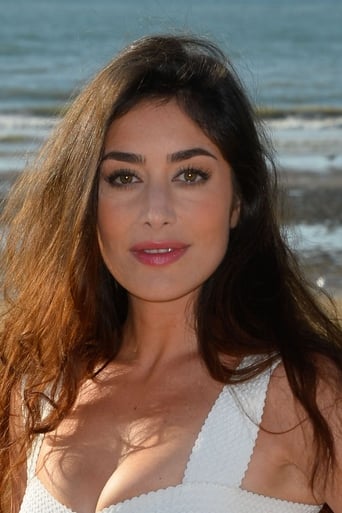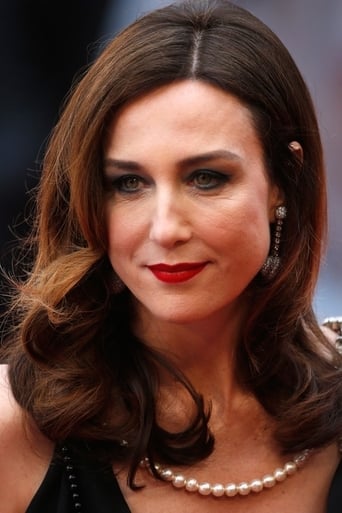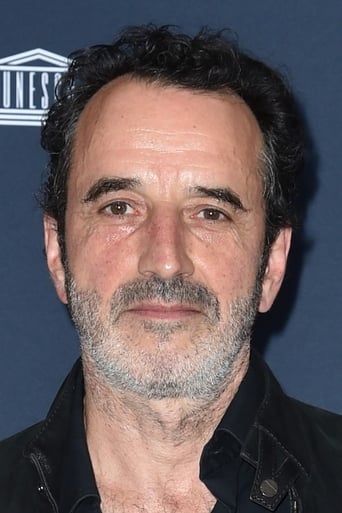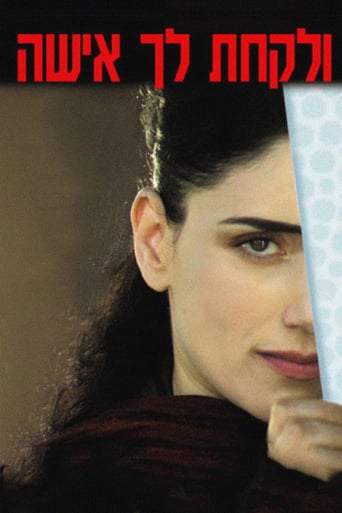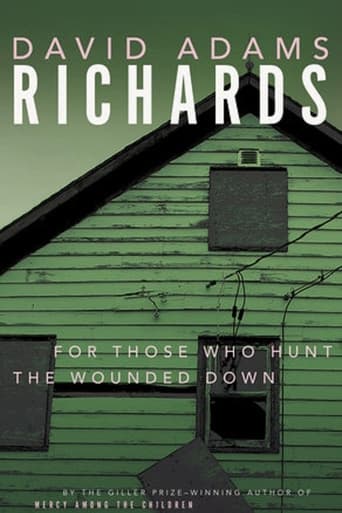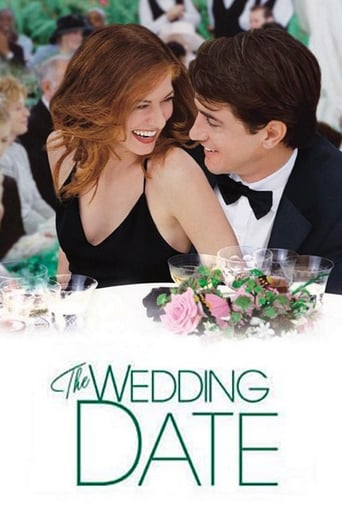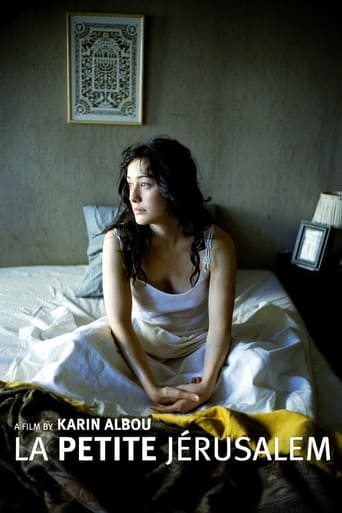
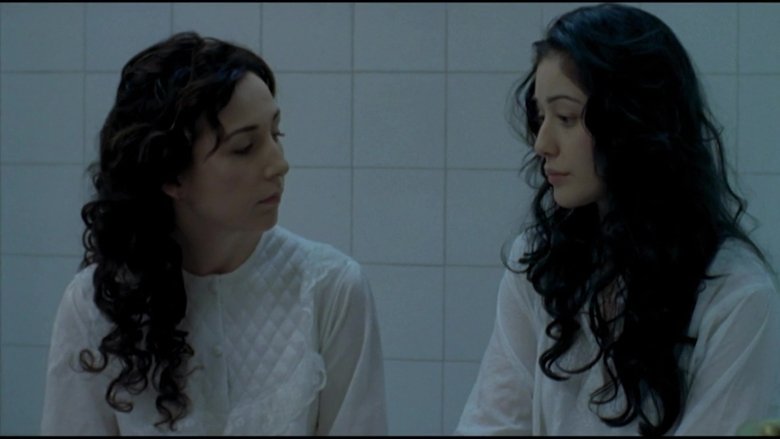
La Petite Jérusalem (2005)
An orthodox Jewish teen living with her family in France attempts to balance her religious upbringing with her increasingly complex view of the outside world.
Watch Trailer
Cast
Similar titles

Reviews
the audience applauded
Good start, but then it gets ruined
A different way of telling a story
This is a small, humorous movie in some ways, but it has a huge heart. What a nice experience.
I thought the movie was well done from the beginning. We center on Laura, from the opening scene breaking from the rest of the crowd to pray on her own beside the river. This could be a slight hint at the direction her faith might be taking. Separate, deep concentration, solitary. etc.. WE learn that she has decided to cast away her premonitions of sensual desires as controlling and things best kept at bay. Until we are introduced to the calm and mysterious Djamel. A scene in the locker room. when he covers her slightly bare arm, was as sensual as any sex scene any movie could produce. We see that his intentions are genuine and not harmful. Their relationship is dwindled when reality is thrown in the mix. Laura cannot deny her heritage and religion, no matter how she rebels, and Djamel cannot escape his past which is written all over him. Mathilde's comes back to haunt Laura..."We are all alone." No matter what we may believe to be truth, in the end we are all alone in the results of our decisions.
Yes, this movie offers a rare view into the lives of two Jewish sisters living with their family in France, the problem is there is not a whole lot of conviction behind the themes, the whole movie just kind of floats by on its own accord, never really making those connections it wishes to with the main characters. Laura, played by the sensual Fanny Valette does do a good job with her various inner struggles, and paints a respectable, and hardly viewed female archetype, in her character breaking with the traditions of family to seek out her own unique philosophies. Although potentially inspiring to the new generations of strict fundamentalist families, there is nothing depicted in this subtle religious rebellion that was not gone over ten fold with other countries feminist and/or religious fare. The resulting transformations of these two sisters seems rote in comparison, and despite the inclusion of several sex scenes, becomes predictable, tedious, and uninvolved all too quickly. Writer/Director Karin Albou does what she can for her part to retain some authenticity and command of her film but ultimately ends up loosing the viewer do to the underdeveloped script and flawed direction.
"La Petite Jerusalem (Little Jerusalem)" is a French intellectual exercise that manages to let feelings come through. Unlike Eric Rohmer's static arguments about mind vs. desire, as between two middle-aged guys in "Claire's Knee," here the clash of philosophies is demonstrated through a year in the intimate daily lives of two Orthodox Jewish sisters.While the intellectual discussions are very didactically presented through these two incredibly naive, but very intelligent, women, the very frank portrait of life in an intensely religious North African immigrant community, which debut writer/director Karin Albou comes from, is moving. The older sister, Mathilde (Elsa Zylberstein), represents the unquestioning rule follower of formal religion. She's married with four children, but has evidently never experienced nor knows anything about orgasms and she seems to have had no formal Jewish education as she just parrots lines about faith in all powerful Hashem and knows the rules of kashruth and going to the mikveh for the monthly cleansing ritual (which we see full frontally), but not much else. She is atypically isolated from the usually close women in her community who could provide her information and support. Hers seems a peasant Judaism.The rebellious younger sister, Laura (a very appealing Fanny Valette), is some sort of nonmatriculated philosophy student, but is also teaching and working as a cleaner. She follows to the letter first one than another secular philosophers' dictates, including celibacy, as rigidly as her brother-in-law head-of-the-household is apparently following the daily prayers, weekly Shabbat and seasonal rules of Judaism. Her intellectual rigidity leads her to reject the handsome Jewish medical student who comes to her for philosophical tutoring because he is too interested in the romantics and because her mother encourages the relationship with superstitious charms. The widowed mother's faith in magic is posited as a third way, along with the warm love of her children that is challenged but never wavers.Both sisters are faced with a heart breaking crisis of romantic passion in their lives that their philosophies don't seem to be able to reconcile. (Sorry, but it is beyond ludicrous that every woman in the household is mystified that the younger feels a certain stirring when a young handsome, dark-skinned Arab looks at her, and it's too bad that we learn so little about him except that he too is an intellectual who is torn about being a rebel within his family and culture.) But I saw that each just matured and learned that their views were immaturely narrow and ill-informed. They hadn't realized that for thousands of years folks have been reconciling human nature with intellect and finding a way to live with both, as gently pointed out by their mentors. Each learns to bend, while finding strength in their individual beliefs in unpredictable ways.The best part of the film is the realistic depiction of celebration of the Jewish holidays amidst multicultural life within the crowded les banlieues surrounding Paris (very comparable to neighborhoods in Brooklyn NYC) where we also saw romantic tensions in "Lila Says (Lila dit ça)" and "Games of Love and Chance (L'Esquive)." The film opens with tashlich, the symbolic discarding of sins for the new year, moves on to the celebration of the Torah in Simhat Torah and on to Purim. If this was an American family we'd see a seder and menorah lighting, but here Passover and Hanukkah are represented simply as special synagogue services. Here we also see the anti-Semitic violence that has threatened French Jews since the Intifada spilled over into Europe, which I haven't seen in films before. It is very ironic that this Tunisian Jewish family is as much refugees from North Africa as their Muslim Algerian neighbors who reject them.
This is a terrific film, centered on the life of a family of Tunisian Jewish immigrants in the desolate Paris banlieue of Sarcelle (aka la Petite Jérusalem). We follow two stories : Laura (played by the ravishing Fanny Valette) is a 19 year-old philosophy student, committed to Kant and to rationalism in the midst of a pietistic household which, to put it mildly, does not share her enthusiasm for philosophy (as his pious sister remarks, philosophers take aim at their target and hit the bullseye : problem is, they're aiming at the wrong target). So taken is Laura by Kant that she imitates his daily promenade, every day at the same time...unlike Kant, however, Laura's stroll happens to lead her past the door of the darkly handsome Algerian clandestine immigrant alongside whom she works as a janitor in the evenings. The rest is not hard to predict, but Abdou's direction is always restrained, subtle, understated. There is never a moment in which here characters' words or actions ring false. This is, by the way, one of the best portrayals of philosophy I have ever seen in a film : we often see Laura in her philosophy class, where a Derrida-lookalike prof discourses - rather eloquently - on freedom versus the law in Kant. This stuff actually *matters* to Laura, but the Law she is concerned with is, of course, the law of the Torah. Can freedom be reconciled with obeying the Law? That's Laura's dilemma, and Albou treats it with dignity yet without sententiousness.The other main focus of the film is Laura's older sister Mathilde, played in an award- deserving performance by Elsa Zylberstein. Married with four children, she is deeply pious and sure of herself until she discovers her husband's been fooling around. Her only solace then is the ritual bath, and she seeks sexual advice from its wise attendant in order not to lose her husband. It would have been easy to treat this scene as slapstick, but instead it's done with the greatest respect for the characters involved : Mathilde, who is afraid of losing her modesty and giving way to the dark tendencies of her soul, is astonished to learn that yes, according to the Torah, she is in fact allowed to touch her husband's genitals. Watch also for the lovely scene where Mathilde asks for sexual advice from her mother (the excellent Sonia Tahar). Every dialog rings true, and the superstitious mother, who initially comes across as a domineering harpy, is revealed as a woman of depth and dignity : not because she evolves or "sees the light", but just because we get to know her better.This is a deeply humanist film, set against a background of the utmost contemporary relevance (a synagogue is burned and a group of soccer-playing Jews is attacked by a group of masked thugs ). It's impossible to come away from this film without a deeper understanding of, and therefore respect for, an entire aspect of Sephardic Jewish culture from a feminine point of view
